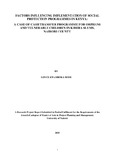| dc.description.abstract | Majority of the Kenyan orphans live under extreme poverty conditions with relatives or
guardians who are also often poor and therefore unable to provide basic care for these children.
The ‘Cash Transfer for Orphans and Vulnerable Children’ (CT-OVC) in Kenya is a
government-supported programme intended to provide regular and predictable cash transfers
to poor households taking care of OVC.This study focused on Kenya’s urban informal
settlement slum of Kibera, an important caseload of vulnerable population inundated with
frequent shocks and stresses that tend to perpetuate and recycle generational poverty.This study
sought to examine factors influencing implementation of cash transfer programme for
OVC.The study sought to establish how financing, targeting, legal framework and sociocultural
factors influence implementation of the programme. This study was delimited to
Kibera Laini Saba location which has a total of 159 households benefiting from the
programme. Using the Krejcie and Morgan table for determining sample size, 113 individuals
were selected to constitute the sample size for the study. The study adopted a descriptive
survey design. Stratified sampling was used to select the sample size of 113 respondents from
the target population. Questionnaires with both closed and open ended questions were used to
collect data. Content and construct validity were determined through review of questionnaire
by children officers to ascertain that it was comprehensive for the proposed study. Split-half
method was used to test the reliability of questionnaire to ensure that the results obtained
through its use were consistent from one respondent to the other. The questionnaire was split
into two equivalent halves; odd and even questions for all questions, and then a correlation
coefficient for the two halves was computed and adjusted to reflect the entire questionnaire
using the Spearman-Brown prophecy formula. A correlation of 0.946 was computed from the
two halves and this was corrected using the Spearman-Brown prophecy formula and yielded a
corrected Spearman-Brown reliability of 0.972. The instrument was therefore reliable since the
correlation was above 0.8. Data collected was cleaned, coded, categorised and analysed using
SPSS software version 19.It was established all the four factors studied had a positive
correlation on implementation of cash transfer programme for OVC. The study established that
there exists a significant positive relationship between financing and the implementation of the
cash transfer program for OVC in Kibera slums, Nairobi, with a Spearman’s correlation
coefficient of 0.474. The study established that there is a significant positive relationship
between targeting and the implementation of the cash transfer programme for OVC in Kibera
slums, Nairobi, with Spearman’s correlation coefficient of 0.437. The study established that
there is a significant positive relationship between socio-cultural factors and the
implementation of the cash transfer programme for OVC with spearman’s correlation
coefficient of 0.456. The study established that there is a significant positive relationship
between the legal framework and the implementation of the cash transfer programme for OVC
in Kibera slums, Nairobi, with Spearman’s rank correlation coefficient of 0.454.The study
recommends an increase in administrative capacity of the programme to ensure efficiency
when targeting beneficiaries to the programme. There is need to review the amount of cash
given per household to match number of OVC per household. There is also urgent need for
government to sensitize people on policies and laws governing OVC. | en_US |

